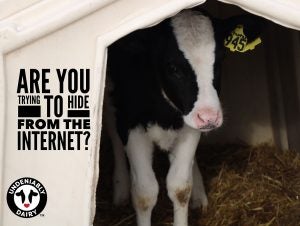Fear of activists targeting the farm is one of the top reasons many farmers mention when I ask why they aren’t using social media to connect with consumers. It’s right up there with, “I don’t have time” and “I don’t have good cellular data.”
I understand why this can be a reasonable answer to why you aren’t engaging with consumers. You believe that you are protecting your farm business.
But are you sure about that?

Here are the top reasons why I think you should engage consumers through social media:
1. There are fewer farmers and more people to reach.
Consumers trust farmers more than anyone when it comes to your animals and your land.
According to USDA, there are around 37,500 dairy farms in the U.S. We also know that the U.S. population is around 330 million and growing slightly. We know that our consumers are generations removed from the farm and about only 2 percent of the population is involved in agriculture. To reach all the people in the U.S., each dairy farmer would have to connect with 8,800 people.
This is very different than in the 1980s when there were more than 334,000 dairy farms and a population of 227 million. Back then, a dairy farm would only need to reach 679 people, and most of them were probably only one generation removed from the farm. They likely still had relatives who farmed.
If you want to protect the farm and your ability and right to continue farming, the only way to reach at least 8,800 people (from the urban areas) is through social media.
2. Two-thirds of people get their news and recommendations from social media.
The majority of people get their news from online resources, as well as maintain their relationships and keep track of their days. If they don’t know something, they look it up on Google or ask their online friends for information and reviews.
Groups dedicated to ending animal agriculture know this and put their resources into digital media because they know it can affect public perception, sells their products and brings in donations.
If the farmer’s voice isn’t in the digital space with video, photos, and text, then how can the consumer find and research that information?
3. Social media has dramatically changed more than one industry.
Farming is not the only industry to be changed by the internet and social media. Fake news has seriously affected traditional news organizations (look at how many local newspapers have gone out of business).
Health misinformation has caused eradicated diseases to come back, and doctors and dietitians are forced to defend their education and credentials. Local restaurants and service-oriented businesses deal with online reviews and negativity in social media on a daily basis.
So, the answer to the question we started with is “yes.” There is a possibility that activists will target your farm if you use social media. And I would say that in this world of mass digital information, they can target your farm without it. According to the activists themselves, they target those farms that grant them access, knowingly or not. No animal farm, no matter the size or if it offline or not, is safe.
If you decide to use social media to reach consumers, let them know you are doing right by your animals, your land, and your employees. If you are transparent and answer their questions, then something else will happen that will be hard to break: it will strengthen their trust in you and the products you produce. You will get their loyalty and they’ll be happy to spread your message to their friends and family.
Are you a dairy farmer who needs help getting started in social media and connecting with consumers? Your local and national dairy checkoff can help — please reach out to them via dairy.org or me at don.schindler@dairy.org. If you would like to learn more about your national dairy checkoff, you can join our Facebook group or visit dairy.org.


